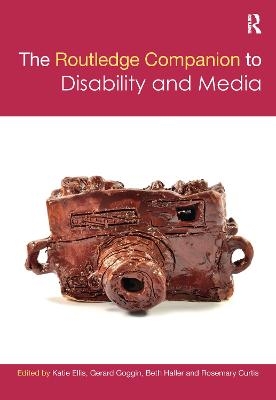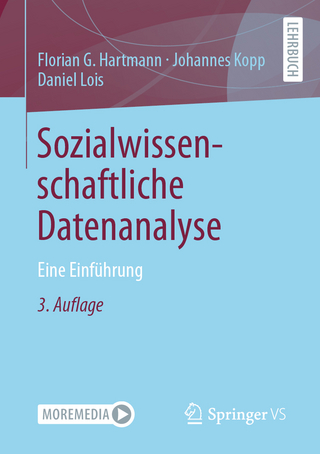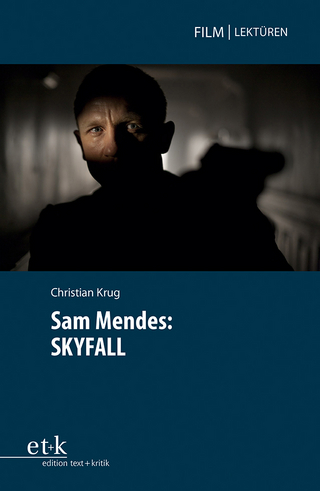
The Routledge Companion to Disability and Media
Routledge (Verlag)
978-1-032-08537-1 (ISBN)
An authoritative and indispensable guide to disability and media, this thoughtfully curated collection features varied and provocative contributions from distinguished scholars globally, alongside next-generation research leaders.
Disability and media has emerged as a dynamic and exciting area of contemporary culture and social life. Media–– especially digital technology––play a vital role in disability transformations, with widespread implications for global societies and how we understand communications. This book addresses this development, from representation and audience through technologies, innovations and challenges of the field. Through the varied and global perspectives of leading researchers, writers, and practitioners, including many authors with lived experience of disability, it covers a wide range of traditional, emergent and future media forms and formats.
International in scope and orientation, The Routledge Companion to Disability and Media offers students and scholars alike a comprehensive survey of the intersections between disability studies and media studies
This book is available as an accessible eBook. For more information, please visit https://taylorandfrancis.com/about/corporate-responsibility/accessibility-at-taylor-francis/.
Katie Ellis is Associate Professor in Internet Studies and Director of the Centre for Culture and Technology at Curtin University (Australia). She has worked with people with disabilities in government, academia and the community. She has authored and edited 15 books and numerous articles on the topic, including two award-winning papers on digital access and social inclusion. Gerard Goggin is Wee Kim Wee Chair in Communication Studies at Nanyang Technological University (Singapore). Since 2011, he has been Professor of Media and Communications at the University of Sydney. With Christopher Newell, he authored the highly influential Digital Disability (2003) and Disability in Australia (2005; winner of the Australian Human Rights Commission Arts Nonfiction Award). Other key books include Normality and Disability: Intersections Among Norms, Laws and Culture (2018; with Linda Steele and Jess Cadwallader), and Listening to Disability: Voices of Democracy (2020; with Cate Thill and Rosemary Kayess). Beth Haller is the author of Representing Disability in an Ableist World: Essays on Mass Media (2010) and the editor of Byline of Hope: Collected Newspaper and Magazine Writing of Helen Keller (2015). She has been researching news and entertainment media images of disability since 1991. She is currently Professor of Mass Communication at Towson University in Maryland (USA), where she also teaches in the University’s Applied Adult Disability Studies minor. She is an adjunct disability studies professor at City University of New York and York University (Canada). Rosemary Curtis is a researcher with over 40 years experience specialising in the screen industries. Following ten years in the library at the Australian Film, TV and Radio School, Rosemary managed the research unit at the Australian Film Commission and Screen Australia from 1990 to 2009. In 2000 Rosemary was awarded the Australian Communications Research Forum award for Outstanding Contribution to Research in an area of Communications.
Introduction: Disability and Media––an Emergent Field
GERARD GOGGIN, KATIE ELLIS, BETH HALLER, AND ROSEMARY CURTIS
PART I
Imagining and Representing Disability
Disability Imaginaries in the News
TANYA TITCHKOSKY
What’s It All Worth? The Political Economy of Disability Representation in Indian Media
NOOKARAJU BENDUKURTHI AND USHA RAMAN
Decolonizing the Dynamics of Media Power and Media Representation Between 1830 and 1930: Australian Indigenous Peoples with Disability
JOHN GILROY, JO RAGEN AND HELEN MEEKOSHA
Featuring Disabled Women in Advertisements: The Commodification of Diversity?
ELLA HOUSTON
Still Playing It Safe: A Comparative Analysis of Disability Narratives in The Sessions, Breathing Lessons, and "On Seeing A Sex Surrogate"
JONATHAN BARTHOLOMY
Mental Distress, Romance and Gender in Contemporary Films: Greenberg and Silver Linings Playbook
ALISON WILDE
Still Julianne: Projecting Dementia on the Silvering Screen
SALLY CHIVERS
Authentic Disability Representation on U.S. Television Past and Present
BETH HALLER
The Spectacularization of Disability Sport: Brazilian and Australian Newspaper photographs of 2012 London Paralympic Athletes
TATIANE HILGEMBERG, KATIE ELLIS AND MADISON MAGLADRY
George R. R. Martin and the Two Dwarfs
MIA HARRISON
Embodying Metaphors: Disability Tropes in Political Cartoons
BETH HALLER
Resisting Erasure: Reading (Dis)ability and Race in Speculative Media
SAMI SCHALK
PART II
Audience, Participation, and Making Media
Producerly Disability Popular Culture: The collision of critical and receptive attitudes
KATIE ELLIS
The Bodies of Film Club: Disability, Identity, and Empowerment
FIONA WHITTINGTON-WALSH, AND KYA BEZANSON, CHRISTIAN BURTON, JACI MACKENDRICK, KATIE MILLER, EMMA SAWATZKY, COLTON TURNER
Disability Narratives in the News Media: A Spotlight on Africa
OLUSOLA OGUNDOLA
Disabled Media Creators in Afghanistan, China and Somalia
PATRICIA CHADWICK
Youth with Disabilities in Africa: Bridging the Disability Divide
KIMBERLY O’HAVER
Engaging Accessibility Issues through Mobile Videos in Montréal
LAURENCE PARENT
Pages of Life: Using a Telenovela to Promote the Inclusion of Students with Disabilities in Brazil
PATRICIA ALMEIDA
How Do You Write That in Sign Language?: A Graphic Signed Novel as Source of Epistemological Reflection on Writing
VÉRO LEDUC
PART III
Media Technologies of Disability
GimpGirl: Insider Perspectives on Technology and the Lives of Disabled Women
JENNIFER COLE AND JASON NOLAN
Digital Media Accessibility: An Evolving Infrastructure of Possibility
ELIZABETH ELLCESSOR
Making the Web More Interactive and Accessible for Blind People
JONATHAN LAZAR AND BRIAN WENTZ
Social Media and Disability—It’s Complicated
MICHAEL KENT
When Face-to-Face is Screen-to-Screen: Reconsidering Mobile Media as Communication Augmentations and Alternatives
MERYL ALPER
Mobile Phones and Visual Impairment in South Africa: Experiences from a Small Town
LORENZO DALVIT
Video on Demand: Is this Australia’s New Disability Divide?
WAYNE HAWKINS
Individuals with Physical Impairments as Life Hackers?: Analyzing Online Content to Interrogate Dis/Ability and Design
JERRY ROBINSON
Interdependence in Collaboration with Robots
ELEANOR SANDRY
PART IV
Innovations, Challenges, and Future Terrains of Transformation
Dropping the Disability Beat: Why Specialized Reporting Doesn’t Solve Disability (Mis)representation
CHELSEA TEMPLE JONES
Advertising Disability and the Diversity Directive
JOSH LOEBNER
Disability Advocacy in BBC’s Ouch and ABC’s Ramp Up
SHAWN BURNS
Representing Difference: Disability, Digital Storytelling, and Public Pedagogy
CARLA RICE AND ELIZA CHANDLER
Needs Must: Digital Innovations in Disability Rights Advocacy
FILIPPO TREVISAN
Disability Media Work
KATIE ELLIS AND MELISSA MERCHANT
Books and People with Print Disabilities: Public Value and the International Disability Human Rights Agenda
DAVID ADAIR AND PAUL HARPUR
| Erscheinungsdatum | 01.07.2021 |
|---|---|
| Reihe/Serie | Routledge Media and Cultural Studies Companions |
| Verlagsort | London |
| Sprache | englisch |
| Maße | 178 x 254 mm |
| Gewicht | 870 g |
| Themenwelt | Sozialwissenschaften ► Kommunikation / Medien ► Medienwissenschaft |
| Sozialwissenschaften ► Soziologie | |
| ISBN-10 | 1-032-08537-1 / 1032085371 |
| ISBN-13 | 978-1-032-08537-1 / 9781032085371 |
| Zustand | Neuware |
| Haben Sie eine Frage zum Produkt? |
aus dem Bereich


